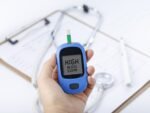Showing 127–135 of 521 results
- 20%
-
1%
BONE PROFILE – ADVANCED
A bone profile blood test assesses bone health by measuring levels of key minerals, proteins, and enzymes in the blood, providing insights into bone turnover, mineral balance, and overall skeletal health.Here’s a more detailed explanation:What a Bone Profile Measures:-
-
Calcium:Essential for bone health, nerve function, and muscle contraction.
-
Phosphate:Works with calcium to maintain bone health and is crucial for energy production and cell function.
-
-
Alkaline Phosphatase (ALP):An enzyme produced by osteoblasts during bone formation; elevated levels can indicate increased bone turnover or bone growth.
-
Albumin:A protein created in the liver, low levels are associated with lower bone density.
-
Other markers:Depending on the specific test, a bone profile may also include markers like osteocalcin (a protein produced by osteoblasts during bone formation).
Why Bone Profile Tests are Important:-
Diagnosis:Bone profile tests can help diagnose and monitor conditions like osteoporosis, Paget’s disease of the bone, and other bone disorders.
-
Monitoring Bone Health:They can track bone turnover and mineral balance, helping healthcare professionals assess the overall health of the skeleton.
-
Evaluating Metabolic Processes:The test helps determine how well the body’s metabolic processes are affecting the skeleton.
-
Assessing Bone Density:A bone density scan (DEXA scan) is often used alongside a bone profile to assess bone strength and density.
When a Bone Profile Test Might Be Recommended:-
Osteoporosis Risk Factors:Individuals with a family history of osteoporosis, those who have experienced fractures, or those who are at risk due to age or other factors may be recommended for a bone profile.
-
Suspected Bone Disorders:If someone has symptoms or signs of bone problems, such as pain, fractures, or changes in bone density, a bone profile might be ordered.
-
Monitoring Treatment:Bone profile tests can be used to monitor the effectiveness of treatments for bone disorders.
-
Other Conditions:Bone profile tests can also be used to assess conditions that affect bone health, such as kidney problems, liver disease, or hormone imbalances.
₹3,250.00Original price was: ₹3,250.00.₹3,200.00Current price is: ₹3,200.00. -
-
2%
BONE PROFILE – BASIC
A bone profile blood test assesses bone health by measuring levels of key minerals, proteins, and enzymes in the blood, providing insights into bone turnover, mineral balance, and overall skeletal health.Here’s a more detailed explanation:What a Bone Profile Measures:-
-
Calcium:Essential for bone health, nerve function, and muscle contraction.
-
Phosphate:Works with calcium to maintain bone health and is crucial for energy production and cell function.
-
-
Alkaline Phosphatase (ALP):An enzyme produced by osteoblasts during bone formation; elevated levels can indicate increased bone turnover or bone growth.
-
Albumin:A protein created in the liver, low levels are associated with lower bone density.
-
Other markers:Depending on the specific test, a bone profile may also include markers like osteocalcin (a protein produced by osteoblasts during bone formation).
Why Bone Profile Tests are Important:-
Diagnosis:Bone profile tests can help diagnose and monitor conditions like osteoporosis, Paget’s disease of the bone, and other bone disorders.
-
Monitoring Bone Health:They can track bone turnover and mineral balance, helping healthcare professionals assess the overall health of the skeleton.
-
Evaluating Metabolic Processes:The test helps determine how well the body’s metabolic processes are affecting the skeleton.
-
Assessing Bone Density:A bone density scan (DEXA scan) is often used alongside a bone profile to assess bone strength and density.
When a Bone Profile Test Might Be Recommended:-
Osteoporosis Risk Factors:Individuals with a family history of osteoporosis, those who have experienced fractures, or those who are at risk due to age or other factors may be recommended for a bone profile.
-
Suspected Bone Disorders:If someone has symptoms or signs of bone problems, such as pain, fractures, or changes in bone density, a bone profile might be ordered.
-
Monitoring Treatment:Bone profile tests can be used to monitor the effectiveness of treatments for bone disorders.
-
Other Conditions:Bone profile tests can also be used to assess conditions that affect bone health, such as kidney problems, liver disease, or hormone imbalances.
₹2,250.00Original price was: ₹2,250.00.₹2,200.00Current price is: ₹2,200.00. -
-
4%
C-PEPTIDE FASTING, SERUM
C-Peptide is useful in distinguishing Insulinomas from exogenous insulin administration. It’s concentrations are severely decreased or absent in Type I Diabetes mellitus. C-Peptide is also useful in monitoring patients who have received islet cell or pancreatic transplants.
A C-peptide fasting serum test measures the amount of insulin your body produces. It’s a blood test that involves fasting overnight.Purpose-
- To diagnose and monitor diabetes
- To determine the cause of low blood sugar
- To monitor treatment for tumors in the pancreas
- To evaluate pancreatic function
How it’s performed- After fasting for 8 to 12 hours, a blood sample is taken in a red-top or gel-barrier tube
- The serum is separated from the cells and transferred to a transport tube
- The sample is refrigerated and transported
What it shows- High levels of C-peptide indicate type 2 diabetes
- Low levels of C-peptide indicate type 1 diabetes
- C-peptide levels can help distinguish between endogenous insulin (produced by the pancreas) and exogenous insulin (administered externally)
Other uses- C-peptide levels can help guide treatment decisions for diabetes or other insulin-related conditions
- C-peptide levels can help monitor the health and function of the pancreas
₹1,050.00Original price was: ₹1,050.00.₹1,000.00Current price is: ₹1,000.00. -
-
4%
C-PEPTIDE POST PRANDIAL, SERUM
C-Peptide is useful in distinguishing Insulinomas from exogenous insulin administration. It’s concentrations are severely decreased or absent in Type I Diabetes mellitus. C-Peptide is also useful in monitoring patients who have received islet cell or pancreatic transplants.
A postprandial C-peptide serum test measures the amount of C-peptide in your blood after eating. C-peptide is a byproduct of insulin production, and measuring it can help determine how well your pancreas is responding to food.What it’s used for-
- Diagnosing and managing diabetes
- Distinguishing between type 1 and type 2 diabetes
- Tailoring treatment plans
- Helping to find the cause of hypoglycemia (low blood sugar)
How it works- The pancreas releases equal amounts of C-peptide and insulin into the bloodstream
- C-peptide stays in the blood longer than insulin, making it easier to measure
- A C-peptide test can’t diagnose diabetes, but it can indicate if your body can produce insulin
What to expect- You may need to fast overnight before the test
- The test is performed using a blood sample
- The sample is collected in a red-top tube or gel-barrier tube
- The sample is refrigerated during transport and storage
₹1,050.00Original price was: ₹1,050.00.₹1,000.00Current price is: ₹1,000.00. -
-
37%
₹1,200.00Original price was: ₹1,200.00.₹750.00Current price is: ₹750.00. - 4%
-
2%
₹10,000.00Original price was: ₹10,000.00.₹9,800.00Current price is: ₹9,800.00. -
1%
CARDIAC PROFILE – BASIC
Heart failure (HF) has been recognized as a common complication of diabetes, with a prevalence of up to 22% in individuals with diabetes and increasing incidence rates. Detection of people at high risk for HF (stage A) or those with stage B HF (without symptoms but with either structural/ functional cardiac abnormalities or elevated biomarkers natriuretic peptides or troponin) would permit earlier implementation of effective strategies to prevent or delay the progression to advanced HF in individuals with diabetes
₹3,050.00Original price was: ₹3,050.00.₹3,000.00Current price is: ₹3,000.00.









